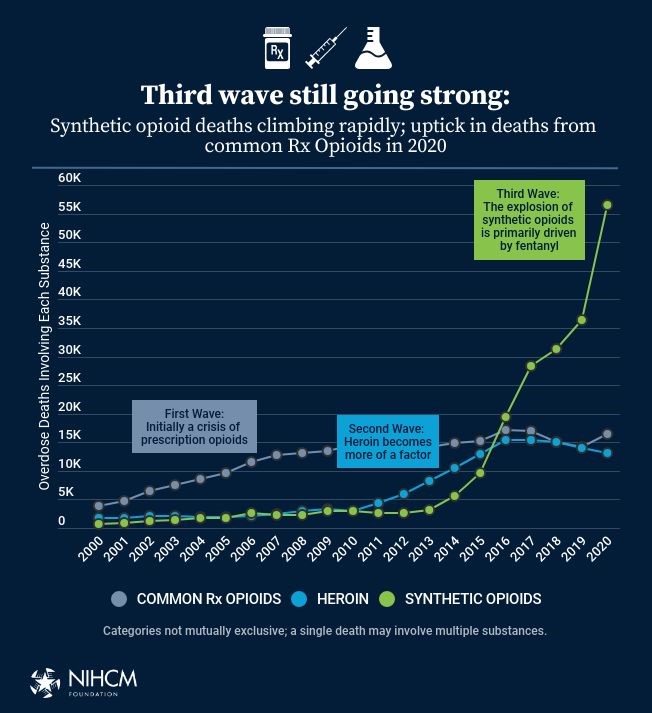It’s not a surprising pronouncement when we say that Southern Florida has a drug problem. In 2022, there were 1,470 drug overdose deaths in the counties that make up the Miami metropolitan area (Miami-Dade, Broward, and Palm Beach counties). That year, the overdose reversal medication naloxone was administered during overdose on 8,719 occasions in those same three counties.
Why overdose is taking such a toll—The third wave of the opioid crisis
We’ve been talking about the opioid crisis for years, so sometimes it seems like nothing is changing. But the crisis has actually been evolving, and experts break it down into three distinct waves that map onto the availability of certain opioids.
- First wave: In the 90s, there was a surge in the prescribing of opioids, encouraged by pharmaceutical companies who were sometimes extremely misleading about the risks. This was followed by a corresponding rise in overdose deaths involving prescription opioids beginning in 1999.
- Second wave: Heroin began to become more readily available in 2010, causing a new wave of overdose deaths involving heroin.
- Third wave: As illicit fentanyl and similar synthetic opioids became available in 2013, there began to be a rapid increase in overdose deaths involving them.
Previous waves don’t end when a new one begins, so prescription medications and heroin continue to contribute to overdoses, even now that the third (fentanyl) wave is well established.
Difficulty accessing medication-assisted treatment in Florida
Despite opioid use disorder (OUD) and opioid overdose being on the rise, it is often difficult for Miami residents to find evidence-based care. In 2019, only 32% of addiction treatment facilities in Florida offered buprenorphine or methadone for OUD.
And it can be even harder to find an OUD treatment provider during pregnancy. A 2022 study in which Florida researchers posed as pregnant women seeking to continue medication-assisted treatment for opioid use disorder revealed major difficulty in finding care.
“When a woman was seeking treatment to stop using opioids, regardless of pregnancy or insurance status, only 25 percent of over 1,000 buprenorphine prescribers … and 64 percent of all 139 opioid treatment programs … offered appointments.” —Dr. Jennifer Marshall
The Florida Shuffle
“The Florida Shuffle” is a somewhat dismissive name for a damaging practice. Unqualified treatment providers try to attract (or pay brokers to bring in) people with substance use disorders who have health insurance. Then the insurance is billed at high rates while the people get minimal, often unhelpful treatment. Upon discharge, they are often sent to sober living facilities that also charge heavily for urine drug screens. The “shuffle” refers to the way people with substance use disorders often cycle from facility to facility—detox to treatment to sober living and back again—getting very little care but a whole lot of bills.
This unethical practice isn’t unique to Florida, but it is common in the state.
Finding Suboxone treatment in Miami
Some providers don’t feel comfortable prescribing buprenorphine (the main medication in Suboxone), even though they are legally able to as long as they complete an 8-hour training from the DEA. Conscientious providers may worry about prescribing a medication they’re unfamiliar with, worried about getting things wrong for their patients. Less conscientious providers may buy into the stigma around medication-assisted treatment or addiction in general. Either way, it can be difficult to find a Miami clinician who meets your needs.
One option is to go with an online Suboxone provider. For example, all Workit Health clinicians have the training and experience to prescribe Suboxone as appropriate. Our opioid treatment programs operate 100% online, so you can access them anywhere that you have internet connection. And Workit Health is not the only telehealth provider in Florida.
To find an in-person provider in the Miami area, try SAMHSA’s Buprenorphine Practitioner Locator. Or look at the app for your insurance plan to see if they list the providers in your area who accept your insurance for Suboxone.
Is it legit to get a Suboxone prescription online in Florida?
Yes, it is legal and possible for Floridians to get a Suboxone prescription online. The Ryan Haight Act (Ryan Haight Online Pharmacy Consumer Protection Act of 2008) includes a national requirement that patients be evaluated in person before being inducted on Suboxone. In 2020, some of these restrictions were loosened to allow treatment during the COVID-19 pandemic, and many states made it possible for Suboxone treatment to be provided via telemedicine. In 2022, Florida law made it legal to prescribe Suboxone via telemedicine (along with many other controlled substances). In 2023 the DEA extended the COVID-era prescribing flexibilities at least through the end of 2024.
You still need to have a medical consultation with a licensed clinician who can prescribe controlled substances and complete regular drug screens to get Suboxone treatment. All of these can take place via telemedicine. Your provider will discuss your substance use and medical history to determine whether Suboxone is a good fit for you. You will have regular follow-up appointments.
Workit Health offers online appointment options that will work with your availability and e-prescribes Suboxone to your local pharmacy. Workit Health accepts several commercial and Medicare insurance plans in Florida.









